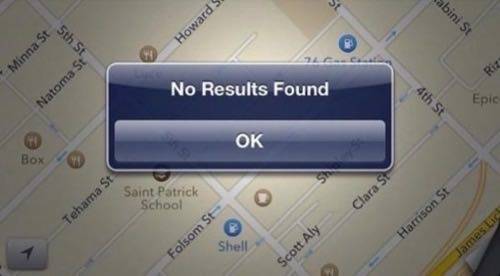Boy, am I glad I didn’t upgrade my iPhone to iOS 6 last week. Apple’s new mobile operating system became available just as I was boarding a plane from Philadelphia to San Francisco to attend a conference and explore the city. I figured it would be better to wait on the upgrade than try and find my way around unfamiliar terrain using a brand new – and untested – mapping application. That turned out to be a good choice.
The rivalry between Google and Apple isn’t new, but in the last several days, it’s gotten personal for users. As the companies butt heads, that’s who has ended up stuck in the middle, left with an experience that’s markedly worse than it was before.

Tech blogs have been flooded with negative assessments of iOS 6 Maps. The main complaints have to do with the app’s lack of transit directions and local search, as well as the accuracy of some of the maps. There are enough visual bugs in the 3D Flyover maps to fill at least one dedicated Tumblr blog, but that’s more a cosmetic issue than a functional one. Apple Insider put together a thorough break-down of the key problems.
Some users reported a pain-free experience using Maps in iOS 6 in the San Francisco Bay Area. It’s possible that the blowback has been disproportionate, but Apple still has a mess on its hands.
Why Did This Happen?
Apple shipped a product that wasn’t entirely ready for its millions of users, however attractive and full of potential it may be, presumably to boot Google from the heart of iOS. Meanwhile, it sounds like Google has taken its time submitting its own native iOS Maps app (even though it was quick to push out its own version of YouTube to fill that particular gap on iOS 6 users’ home screens). Eric Schmidt told reporters today that the company’s engineers “haven’t done anything yet” on the iOS Maps front.
It’s tempting to ascribe Google’s foot-dragging to a desire to drive frustrated users toward Android, but that theory is a stretch. Indeed, the launch of Apple’s new mapping app may have come as a total surprise to Google, as reported by The Verge. Allegedly, Apple’s sudden change came more than a year before its partnership with Google was supposed to end and left the search giant scrambling to cobble together its own iOS mapping solution. If this account is true, then what Schmidt meant by “haven’t done anything” was “haven’t submitted an app yet.” Still, some observers have expressed skepticism that Google was completely blindsided by this.
While Google likely hasn’t deliberately delayed the app, the company probably doesn’t mind watching Apple take heat from users and the press. Whatever happened, it doesn’t serve users well.

















